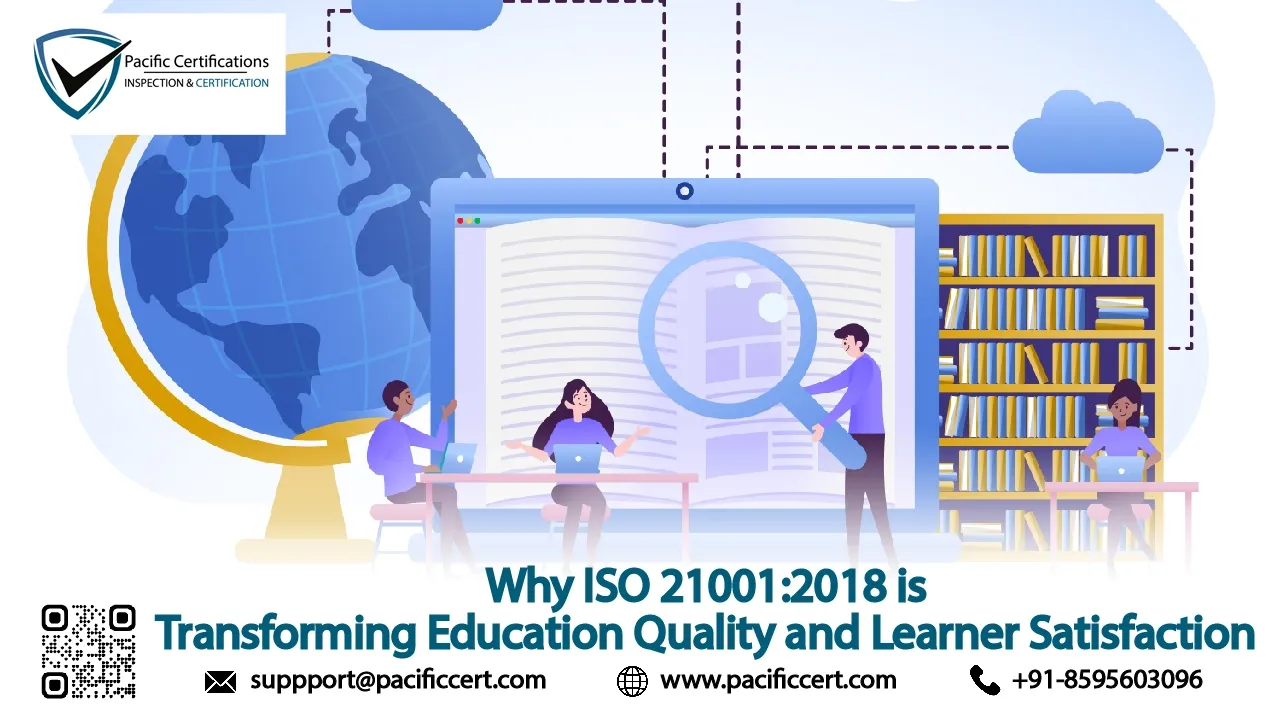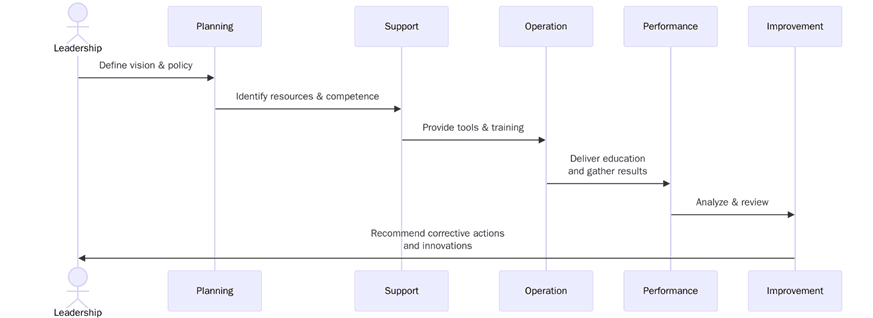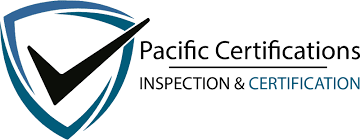Why ISO 21001:2018 Is Transforming Education Quality and Learner Satisfaction?

Education today is no longer about simply delivering academic content. Parents, students, regulators and international partners expect institutions to prove that they can manage quality, safeguard student wellbeing and provide measurable learning outcomes. Traditional accreditation focuses mainly on national benchmarks, but institutions aiming to operate globally need proof of alignment with international standards.
ISO 21001:2018 is the first international standard designed specifically for educational institutions. It provides a management system that improves governance, ensures consistent service delivery and keeps learner satisfaction at the centre. By adopting ISO 21001:2018, schools, colleges, universities and training providers can show accountability, transparency and a commitment to continual improvement in every aspect of education.
Just a 15-minute call with an auditor at Pacific Certifications and your certification pathway is ready!
Quick summary
ISO 21001:2018 adapts quality management principles to the education sector. It focuses on learner satisfaction, transparent administration and measurable performance. Institutions implementing ISO 21001:2018 track KPIs such as curriculum review cycles, student support service levels, exam moderation logs, incident resolution time and faculty training completion. This certification complements national accreditation and provides international credibility for institutions of all sizes.
Introduction
Educational institutions face mounting pressure to prove that teaching, administration and student services meet expectations of accountability and trust. Accreditation validates compliance with local requirements, but ISO 21001:2018 elevates this by aligning institutions with global standards.
The standard encourages institutions to move from informal practices to structured systems where objectives are clear, risks are documented, processes are transparent and performance is measurable. This shift strengthens internal governance, improves learner outcomes and builds an international reputation that supports partnerships and recognition abroad.
Why ISO 21001:2018 is important for education?
ISO 21001:2018 matters because it allows institutions to prove that quality and learner satisfaction are not just goals but are managed systematically. Parents and students gain confidence that teaching, assessments and support services are reliable. Regulators and international partners see evidence that governance is accountable and aligned with global norms.
In many regions, ISO 21001:2018 certification also supports the accreditation process by providing documented proof of quality systems, risk assessments and continual improvement. For institutions competing globally, it is increasingly a requirement for attracting students, research opportunities and partnerships.
ISO 21001:2018 vs ISO 9001 in education
ISO 9001 is a general quality management system standard applicable across industries. ISO 21001:2018 is sector specific and designed with education in mind. Both can be valuable and many institutions adopt them together to show both general service quality and education focused excellence.
What are the requirements for ISO 21001:2018?
To achieve certification, institutions must establish frameworks that address both academic and administrative functions with transparency and accountability. The main requirements include:

Define scope of certification, such as teaching, research or administration
Develop policies for learner satisfaction, curriculum design, data security and governance
Conduct risk assessments for student safety, academic integrity and data management
Document processes for admissions, examinations, course delivery and faculty management
Provide evidence records such as admissions logs, exam moderation files and IT access reviews
Train staff and faculty on responsibilities linked to compliance and learning outcomes
Implement operational controls across classrooms, IT platforms and student services
Carry out internal audits to identify and close performance gaps
Leadership reviews of objectives, KPIs and performance against targets
Correct nonconformities with documented actions and follow up
Commit to continual improvement with curriculum review cycles and student feedback loops
How to prepare for ISO 21001:2018 certification?
Preparation requires aligning current education practices with ISO requirements and building evidence to prove compliance. The steps include:
1. Conduct a gap analysis to identify areas where current processes fall short
2. Update policies for quality, student support and digital learning environments
3. Train faculty and administrative staff on governance roles and documentation needs
4. Maintain records for admissions, exams, student feedback and support services
5. Implement controls for curriculum reviews, service level monitoring and data protection
6. Run internal audits and close findings before the external audit
7. Engage leadership to allocate resources and monitor certification readiness
Certification audit
Stage 1 audit: Reviews scope, policies, academic processes and documented records.
Stage 2 audit: Evaluates implementation across classrooms, student services, IT systems and administration.
Nonconformities: Must be corrected with documented evidence before approval.
Management review: Confirms leadership oversight and accountability.
Final certification: Awarded once compliance gaps are resolved.
Surveillance audits: Conducted annually to monitor continued effectiveness.
Recertification audits: Required every three years to maintain certification.
What are the benefits of ISO 21001:2018?
ISO 21001:2018 certification builds trust, strengthens governance and improves learning outcomes. It provides measurable results through KPIs such as student support SLA adherence, incident resolution times and curriculum review cycles. The main benefits include:

Global recognition that supports student recruitment and partnerships
Improved learner satisfaction through structured teaching and support services
Accountability at all levels of governance and administration
Better use of data and feedback to inform decisions
Measurable improvement through KPIs and continual review cycles
Confidence for parents, students and regulators that standards are met
Recent trends in 2025
In recent years ISO 21001:2018 has seen rapid adoption as institutions respond to demands for transparency, digital learning integration and global competitiveness. Universities and schools increasingly combine ISO 21001:2018 with ISO/IEC 27001 for secure digital platforms and ISO 22301 for continuity planning.
Institutions also publish dashboards linking ISO requirements with KPIs such as student satisfaction scores, SLA performance in student services and audit closure periods. This reflects a shift where ISO 21001:2018 is seen not only as a compliance tool but as a framework for delivering better education and stronger international recognition.
Contact us
Pacific Certifications provides accredited ISO 21001:2018 certification services for schools, colleges, universities and training providers. Our audits help institutions strengthen governance, improve teaching quality and build global credibility.
Request your ISO audit plan and fee estimate, we will help you map Stage 1 and Stage 2 timelines and evidence requirements for your institution. Contact us at [email protected] or visit www.pacificcert.com.
Contact Us
If you need support with ISO 21001:2018 certification, contact us at [email protected].
Read More at: Blogs by Pacific Certifications

